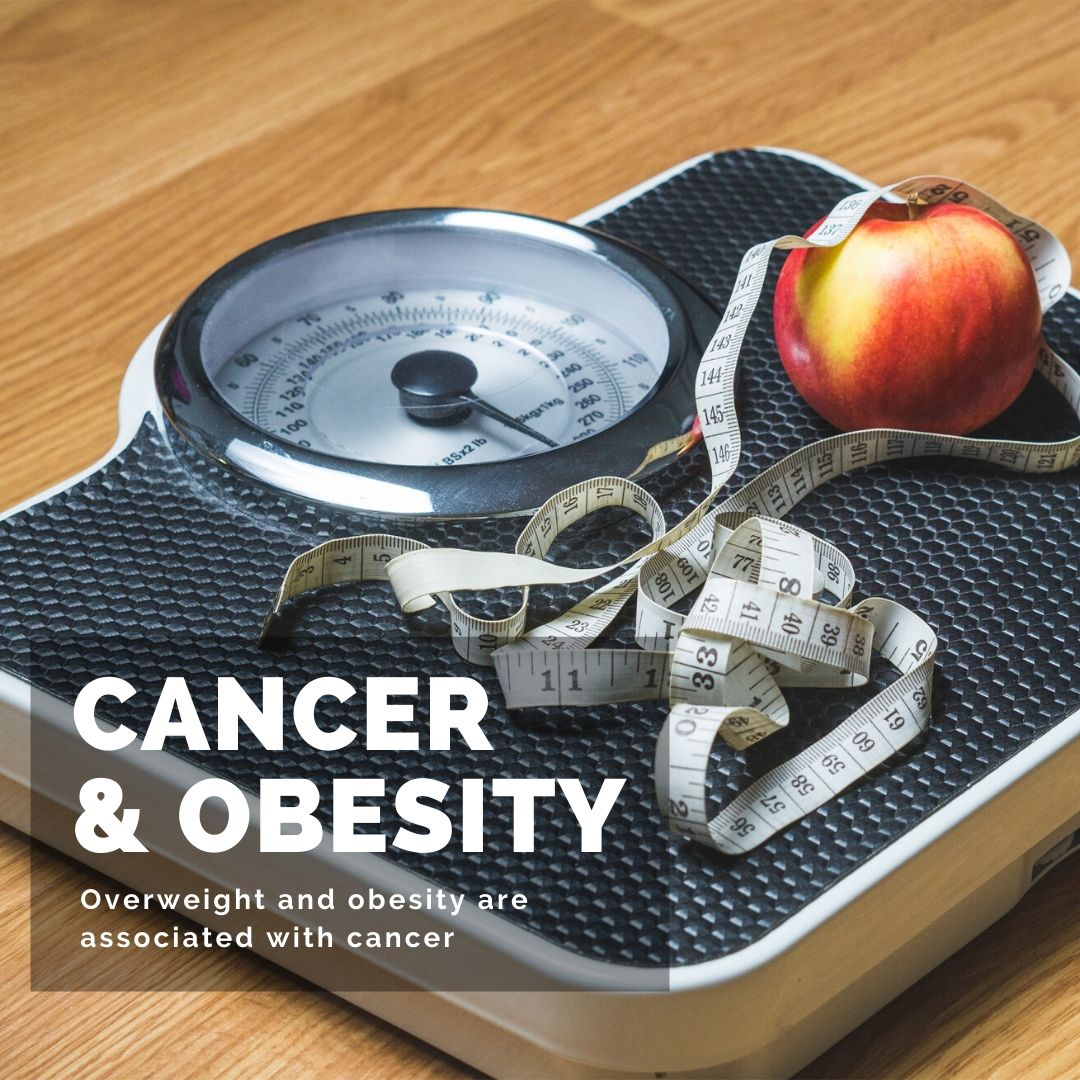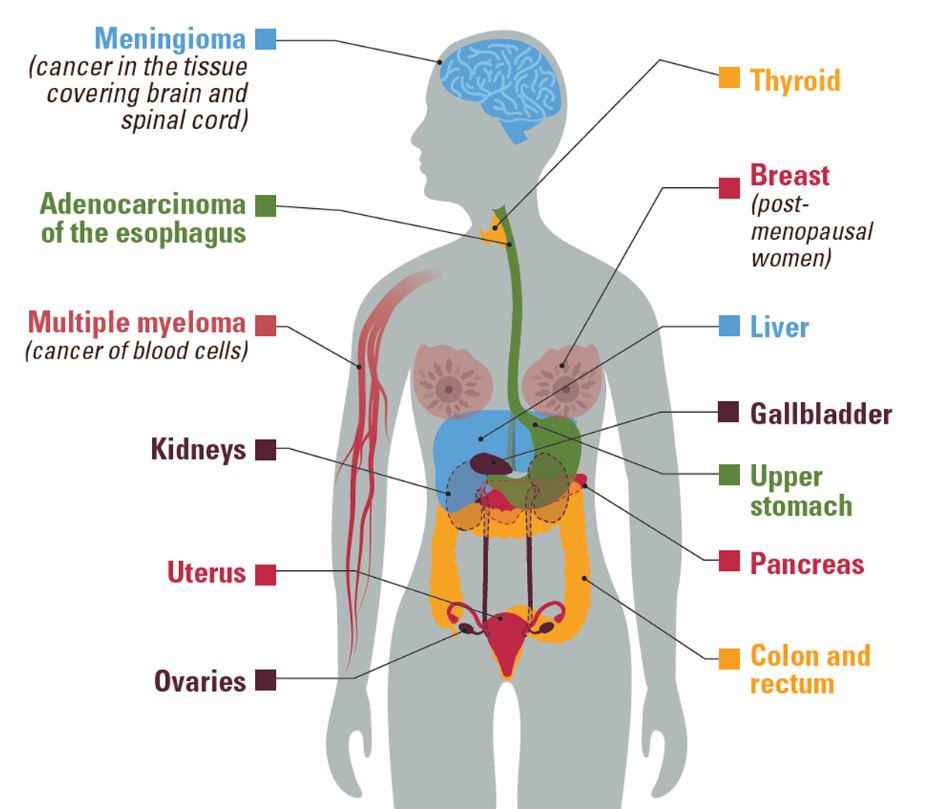
Cancer and obesity

Obesity is a leading cancer risk factor.
- A higher proportion of Americans are overweight or have obesity than several decades ago.
- Overweight and obesity can cause changes in the body that lead to cancer, such as increases in levels of certain hormones and inflammation.
- People who weigh more than recommended may increase their risk of some cancers.
- There are 13 types of cancer associated with overweight and obesity.
- About 55% of all cancers diagnosed in women and 24% of those diagnosed in men.
- About 2 in 3 of all cancers occur in adults ages 50 to 74.
- New cancer cases are higher among blacks and whites compared to other race and ethnic groups.
13 cancers are associated with overweight and obesity.

- Endometrial cancer: Obese and overweight women are two to about four times as likely as normal-weight women to develop endometrial cancer (cancer of the lining of the uterus), and extremely obese women are about seven times as likely to develop the more common of the two main types of this cancer . The risk of endometrial cancer increases with increasing weight gain in adulthood, particularly among women who have never used menopausal hormone therapy.
- Esophageal adenocarcinoma: People who are overweight or obese are about twice as likely as normal-weight people to develop a type of esophageal cancer called esophageal adenocarcinoma, and people who are extremely obese are more than four times as likely .
- Gastric cardia cancer: People who are obese are nearly twice as likely as normal-weight people to develop cancer in the upper part of the stomach, that is, the part that is closest to the esophagus .
- Liver cancer: People who are overweight or obese are up to twice as likely as normal-weight people to develop liver cancer. The association between overweight/obesity and liver cancer is stronger in men than women.
- Kidney cancer: People who are overweight or obese are nearly twice as likely as normal-weight people to develop renal cell cancer, the most common form of kidney cancer . The association of renal cell cancer with obesity is independent of its association with high blood pressure, a known risk factor for kidney cancer .
- Multiple myeloma: Compared with normal-weight individuals, overweight and obese individuals have a slight (10% to 20%) increase in the risk of developing multiple myeloma.
- Meningioma: The risk of this slow-growing brain tumor that arises in the membranes surrounding the brain and the spinal cord is increased by about 50% in people who are obese and about 20% in people who are overweight.
- Pancreatic cancer: People who are overweight or obese are about 1.5 times as likely to develop pancreatic cancer as normal-weight people.
- Colorectal cancer: People who are obese are slightly (about 30%) more likely to develop colorectal cancer than normal-weight people. A higher BMI is associated with increased risks of colon and rectal cancers in both men and in women, but the increases are higher in men than in women.
- Gallbladder cancer: Compared with normal-weight people, people who are overweight have a slight (about 20%) increase in risk of gallbladder cancer, and people who are obese have a 60% increase in risk of gallbladder cancer. The risk increase is greater in women than men.
- Breast cancer: Many studies have shown that, in postmenopausal women, a higher BMI is associated with a modest increase in risk of breast cancer. For example, a 5-unit increase in BMI is associated with a 12% increase in risk. Among postmenopausal women, those who are obese have a 20% to 40% increase in risk of developing breast cancer compared with normal-weight women. The higher risks are seen mainly in women who have never used menopausal hormone therapy and for tumors that express hormone receptors. Obesity is also a risk factor for breast cancer in men. In premenopausal women, by contrast, overweight and obesity have been found to be associated with a 20% decreased risk of breast tumors that express hormone receptors.
- Ovarian cancer: Higher BMI is associated with a slight increase in the risk of ovarian cancer, particularly in women who have never used menopausal hormone therapy (24). For example, a 5-unit increase in BMI is associated with a 10% increase in risk among women who have never used menopausal hormone therapy.
- Thyroid cancer: Higher BMI (specifically, a 5-unit increase in BMI) is associated with a slight (10%) increase in the risk of thyroid cancer.
What Can Be Done?
- Eat a healthy diet by following the 2015-2020 Dietary Guidelines for Americans.
- Do at least 150 minutes of moderate intensity physical activity, such as brisk walking, every week.
- Talk to their healthcare provider about losing weight or maintaining a healthy weight.
- Get involved in community efforts to improve options for healthier foods and physical activity.
- Lose weight, if they weigh more than recommended, to help reduce risk for some cancers and other chronic diseases.
Source:
- CDC
- National Cancer Institute


Most Commented